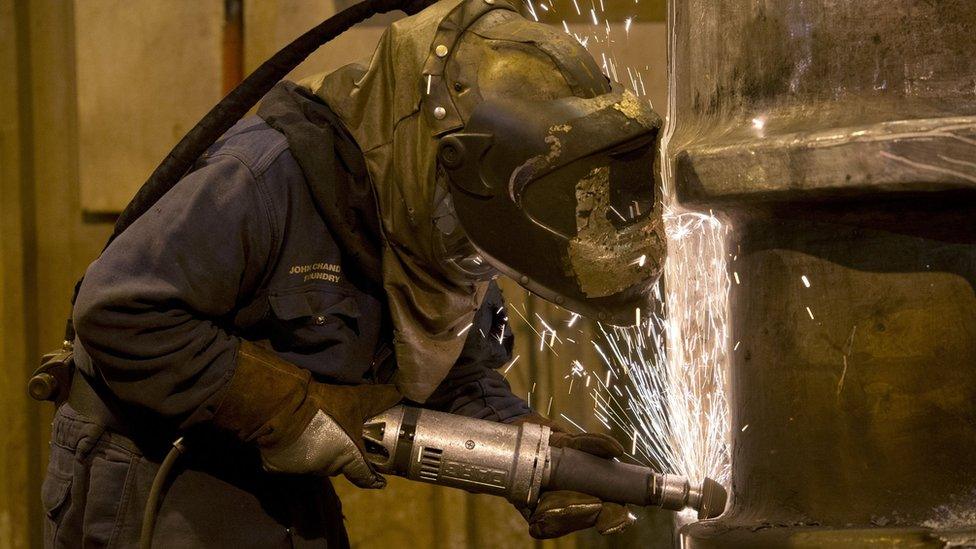Stalled march of the makers
- Published
- comments

If the British economy was driven by manufacturing we could well be in seriously dire economic straits, figures released today show.
So perhaps we should be profoundly grateful that the coalition government elected in 2010 failed so miserably in its ambition to rebalance the UK towards the makers and away from services (UK manufacturing is still more than 5% smaller than it was before the 2008 crash, whereas the service sector is about 10% bigger).
The point is that manufacturing seems to be struggling again: its output fell 0.5% in July compared with a year ago - and was 0.8% lower compared with the previous month.
As for exports of goods, they fell by £2.3bn to £22.8bn in July - to their lowest since September 2010.
And it was a widening of our deficit with the rest of the world in trade of physical stuff that was wholly responsible for an enlargement of the overall deficit in goods and services to £3.4bn.
Manufacturing recession?
Of course it would be foolish to read too much into a single month's figures, but more recent survey data suggests that these statistics are neither anomalous nor a temporary blip.
What is going on? Why, at a time when the British economy is one of the few economic bright spots in the rich developed world, are our manufacturers staring at possible recession?
Well the pound has been strengthening, making our exports less competitive, and the world economy has been slowing down, cutting demand for what we make.
This slowdown has been caused in large measure (as you will surely know by now, since I've been banging on about it) by a deceleration of Chinese growth that has infected the emerging market half of the global economy particularly badly.
All the signs are that this global economy will weaken further.
Encouraging spending
So thank goodness that we have a world-class service sector, which is around 80% of our economy and seems to be less sensitive to global economic conditions.
And hooray for mild deflation that is increasing British households' disposable income and encouraging them to spend a bit more.
But the economy cannot grow at the current rate of 2.5% a year forever based purely on domestic demand - because we are buying more from the rest of the world than we sell to the rest of the world, and are financing our growth by borrowing from the rest of the world at an unsustainably great rate of 5% of GDP or national income.
Or to put it another way, we run the risk that at some point our overseas creditors won't wish to lend quite so much to us to finance our lifestyles - and at that point, they would want their money back and would dump sterling.
At which ill-starred juncture, the price of imports would shoot up and inflation would rise, forcing the Bank of England to raise interest rates more than would be comfortable in our heavily indebted economy.
Which is another way of saying, as if you hadn't guessed, that we are not immune to global economic conditions, even if right now we - and the US - seem to be jogging along quite nicely, as Japan and the eurozone are struggling to walk.
But let's not end on a sour or dismal note.
Some may despair that the rebirth of British manufacturing hasn't been all that might be desired, but the UK's 5% manufacturing shrinkage since the peak is as nothing compared with the 23%, 16% and 14% contractions suffered by Italy, France and Japan respectively.